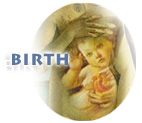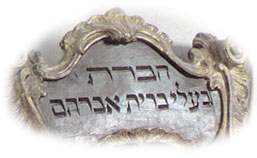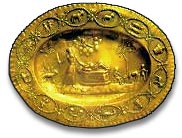|


Brit
(bris) Mila
(Jewish ritual circumcision)
 At
the outset of Jewish history, circumcision (surgical removal of the foreskin)
was established as the immutable sign of the covenant between God and
Abraham and his descendants ever after: At
the outset of Jewish history, circumcision (surgical removal of the foreskin)
was established as the immutable sign of the covenant between God and
Abraham and his descendants ever after:
God further said
to Abraham, "As for you, you and your offspring to come throughout
the ages shall keep My covenant. Such shall be the covenant between
Me and you and your offspring to follow which you shall keep: every
male among you shall be circumcised. You shall circumcise the flesh
of your foreskin, and that shall be the sign of the covenant between
Me and you. And throughout the generations, every male among you shall
be circumcised at the age of eight days. As for the homeborn slave and
the one bought from an outsider who is not of your offspring, they must
be circumcised, homeborn, and purchased alike. Thus shall My covenant
be marked in your flesh as an everlasting pact. And if any male who
is uncircumcised fails to circumcise the flesh of his foreskin, that
person shall be cut off from his kin; he has broken My covenant."
(Genesis 17:9-14)
| Ashkenazi
Jews welcome the birth of a baby (and other happy occasions) with
the words Mazel Tov — Good Luck. Sepharadim have traditionally
welcomed baby boys with Siman Tov and baby girls with Mazel
Tov. The Sephardi authority Hakham Yosef Haim (Baghdad, 1834-1909),
author of Ben Ish Hai, recorded several reasons for this custom:
Siman Tov, which means "a good sign," implies that
the birth of a son will push away harm and suffering and will help
bring much good and blessing. Mazel Tov means that the birth
of a girl will bring good luck and has a basis from the book of the
Prophet Isaiah. |
The Torah does not
supply any reason or rationale for establishing this particular "sign
of the covenant." (See Sarna on
the antiquity of this ritual) The
brit mila takes place on the eighth day after birth, during the daytime.
Even if the eighth day falls on a Sabbath or festival, the circumcision
may still be performed. However, if the circumcision is postponed for
medical reasons it cannot be performed on a Sabbath or festival.
Formally, it is the
father's mitzvah (religious obligation) to perform the circumcision,
although most fathers appoint a trained professional, called a mohel,
to carry on the mitzvah on their behalf. Appropriate
blessings and the formal declaration of the baby's name (English
translation) accompany the circumcision. The
baby's parents may honor relatives or friends by asking them to participate
in the Brit mila ceremony. The sandek holds the baby on
his lap during the circumcision while the "kvatter" and
"kvaterrin" (Yiddish; godfather and godmother) carry the
baby into the room and hand him to the sandek (possibly derived
from the Greek word syntekos — "companion
of child"), who sits a specially designated "Chair of Elijah."
In recent years, some
families have chosen to enrich their son's Brit milah ceremony
with explanations and interpretative reading similar to those used in
ceremonies welcoming baby girls.
Welcoming
a Baby Girl
Traditionally, baby girls are given their Hebrew names at synagogue service
shortly following their birth. The father (or mother or both, depending
on the synagogue and the circumstances) are called to the Torah. After
the reading, a special prayer is recited for the health of mother and
baby. This prayer includes the
public declaration of the baby's name. In
Sephardi synagogues, the basic prayer is augmented with verses
welcoming the baby. In the last three decades, many families have
created special ceremonies expressing their joy at the birth of their
new daughter and their desire to enter her into the Jewish people's covenant.
Just as there is no set form for these new rituals, there no single name
for them either: Among the more common names are:
Britah (Her covenant)
Brit bat (Daughter's covenant)
Simchat bat (Celebration of a daughter)
Brit ha-hayim (Covenant of life)
Brit milah (Covenant of the word [a
play on words based on the Hebrew homonyms for Brit meaning both circumcision
and word])
Brit nerot (Covenant of candles)
Brit Sarah (Covenant of Sarah)
Zebad habat (honoring the daughter
— a traditional Sephardi name)
Pidyon Haben
(redemption of the first born son): After the first-born of Egypt are
slain in the tenth plague, "The Lord spoke further to Moses, saying,
'Consecrate to Me every first-born; man and beast, the first
issue of every womb among the Israelites is Mine.'" (Exodus
13:1-2)
In gratitude
for being spared the fate of the all the other first-born in Egypt, the
Israelite first-born were to become priests serving in the Tabernacle.
However, after the incident of the Golden Calf (Exodus), the Levites are
assigned to service in the Tabernacle, in place of the firstborn, without
nullifying their dedication: "The Lord spoke to Moses, saying: 'I
hereby take the Levites from among the Israelites in place of all the
first-born, the first issue of the womb among the Israelites: the Levites
shall be Mine. For every first-born is Mine: at the time that I smote
every first-born in the land of Egypt, I consecrated every first-born
in Israel, man and beast, to Myself, to be Mine, the Lord's.'" (Numbers
3:11-13) Therefore,
traditional Jews continue the practice of redeeming the firstborn son.
To "require" redemption, the baby must be his mother's firstborn,
not have been born by Caesarian section and neither parent be a Cohen
or Levite (descendants of the Priestly families). During this ceremony,
the father presents his son to a Cohen and then gives the Cohen five ceremonial
silver shekels (the Bank of Israel mints special coins for this purpose),
five silver dollars or the equivalent, in order to redeem the child. Although
the Cohen is entitled to keep the money, he often donates it to tzedakah
(charity) and may even return it to the family, if they are in need.
Shalom Zachor:
A small party that some families hold on the Friday night after a baby
boy is born. The names expresses the wish that child will grow up in peace.
Vach Nacht (Yiddish;
"the night of watching") is the night before the Brit milah.
Observed in very traditional Ashkenazi circles by studying special Torah
portions and having children recite the Shema and other verses
near the baby. Many Sephardic communities also hold special study sessions
on the night before the circumcision, as instructed by the Zohar.
The ceremony includes the study of prescribed selections and the singing
of pizmonim (religious hymns).
|



